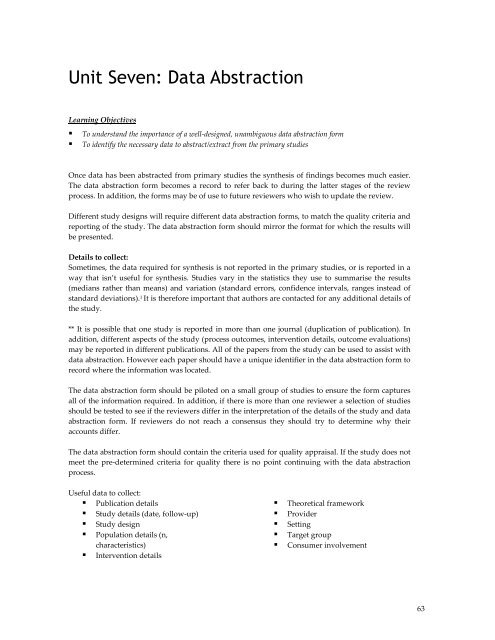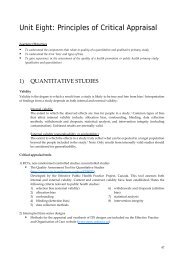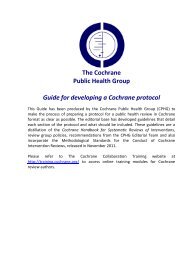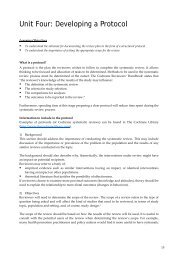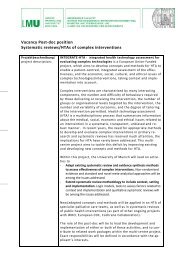Train the Trainer Course book - Cochrane Public Health Group
Train the Trainer Course book - Cochrane Public Health Group
Train the Trainer Course book - Cochrane Public Health Group
You also want an ePaper? Increase the reach of your titles
YUMPU automatically turns print PDFs into web optimized ePapers that Google loves.
Unit Seven: Data Abstraction<br />
Learning Objectives<br />
To understand <strong>the</strong> importance of a well-designed, unambiguous data abstraction form<br />
To identify <strong>the</strong> necessary data to abstract/extract from <strong>the</strong> primary studies<br />
Once data has been abstracted from primary studies <strong>the</strong> syn<strong>the</strong>sis of findings becomes much easier.<br />
The data abstraction form becomes a record to refer back to during <strong>the</strong> latter stages of <strong>the</strong> review<br />
process. In addition, <strong>the</strong> forms may be of use to future reviewers who wish to update <strong>the</strong> review.<br />
Different study designs will require different data abstraction forms, to match <strong>the</strong> quality criteria and<br />
reporting of <strong>the</strong> study. The data abstraction form should mirror <strong>the</strong> format for which <strong>the</strong> results will<br />
be presented.<br />
Details to collect:<br />
Sometimes, <strong>the</strong> data required for syn<strong>the</strong>sis is not reported in <strong>the</strong> primary studies, or is reported in a<br />
way that isn’t useful for syn<strong>the</strong>sis. Studies vary in <strong>the</strong> statistics <strong>the</strong>y use to summarise <strong>the</strong> results<br />
(medians ra<strong>the</strong>r than means) and variation (standard errors, confidence intervals, ranges instead of<br />
standard deviations). 1 It is <strong>the</strong>refore important that authors are contacted for any additional details of<br />
<strong>the</strong> study.<br />
** It is possible that one study is reported in more than one journal (duplication of publication). In<br />
addition, different aspects of <strong>the</strong> study (process outcomes, intervention details, outcome evaluations)<br />
may be reported in different publications. All of <strong>the</strong> papers from <strong>the</strong> study can be used to assist with<br />
data abstraction. However each paper should have a unique identifier in <strong>the</strong> data abstraction form to<br />
record where <strong>the</strong> information was located.<br />
The data abstraction form should be piloted on a small group of studies to ensure <strong>the</strong> form captures<br />
all of <strong>the</strong> information required. In addition, if <strong>the</strong>re is more than one reviewer a selection of studies<br />
should be tested to see if <strong>the</strong> reviewers differ in <strong>the</strong> interpretation of <strong>the</strong> details of <strong>the</strong> study and data<br />
abstraction form. If reviewers do not reach a consensus <strong>the</strong>y should try to determine why <strong>the</strong>ir<br />
accounts differ.<br />
The data abstraction form should contain <strong>the</strong> criteria used for quality appraisal. If <strong>the</strong> study does not<br />
meet <strong>the</strong> pre-determined criteria for quality <strong>the</strong>re is no point continuing with <strong>the</strong> data abstraction<br />
process.<br />
Useful data to collect:<br />
<strong>Public</strong>ation details<br />
Study details (date, follow-up)<br />
Study design<br />
Population details (n,<br />
characteristics)<br />
Intervention details<br />
Theoretical framework<br />
Provider<br />
Setting<br />
Target group<br />
Consumer involvement<br />
63


